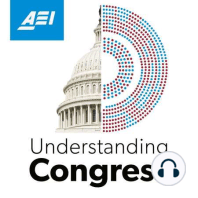25 min listen

What Is the Relationship between Lobbyists and Congress? (with Timothy LaPira)
What Is the Relationship between Lobbyists and Congress? (with Timothy LaPira)
ratings:
Length:
29 minutes
Released:
May 2, 2022
Format:
Podcast episode
Description
The topic of this episode is, “What is the relationship between lobbyists and Congress?”My guest is Timothy LaPira. He is a professor of political science at James Madison University and a faculty affiliate at the Center for Effective Lawmaking at the University of Virginia. Tim, I should add, is the lead editor of our volume Congress Overwhelmed: The Decline of Congressional Capacity and Prospects for Reform (University of Chicago Press, 2020). But even more relevant to the subject of this podcast episode is that Professor LaPira coauthored the book Revolving Door Lobbying: Public Service, Private Influence, and the Unequal Representation of Interests. This makes him an especially apt person to answer the question for us, “What is the relationship between lobbyists and Congress?”Kevin Kosar:Welcome to Understanding Congress, a podcast about the first branch of government. Congress is a notoriously complex institution, and few Americans think well of it, but Congress is essential to our republic. It’s a place where our pluralistic society is supposed to work out its differences and come to agreement about what our laws should be. And that is why we are here: to discuss our national legislature and to think about ways to upgrade it so it can better serve our nation.I’m your host, Kevin Kosar, and I’m a resident scholar at the American Enterprise Institute, a think tank in Washington, DC.Tim, welcome to the podcast.Timothy LaPira:Thank you for having me. Glad to be here.Kevin Kosar:Let's start very simply, with the definition of a lobbyist. Now, under the First Amendment, anyone can petition the government for a redress of grievances, as the Constitution says. So plenty of people do talk to Congress, and the executive branch and judiciary, for that matter. In fact, in my job at a think tank, I am often asked to comment on bills or testify before Congress by congressional staff or even legislators who approach me. But I'm not a lobbyist. So what makes a lobbyist a lobbyist?Timothy LaPira:This is a great question. It's one that's often misunderstood. There's many definitions of what a lobbyist is, but I tend to think of—there's two ways to think about this. First, the more comprehensive, academic version of thinking about a lobbyist. It could go by the name of policy advocate, government relations professional, policy strategist, or something along those lines. These are people who make money to represent other people's interests. Those interests are typically going to be collected in organizations, but it's not just representing those interests in speaking. It's representing those interests in the policymaking process. There has to be a connection between the private sector and the government. So that's a very broad definition. There is, further, a statutory definition, primarily through the Lobbying Disclosure Act of 1995, which has been updated a number of times. In that law, there's a three-test definition of what a lobbyist is. First, they have to earn money. There's a minimum amount of money that's frankly not all that much given the size of the lobbying industry. It's about $5,000 a month. Second, they have to contact more than one government official. The purpose of this in the law, of course, is not to simply capture everyone, as you suggested. They might want to call up their member of Congress and say, "Vote for the bill,” or “Vote against a nominee," or what have you. The third point of the definition is most critical and...
Released:
May 2, 2022
Format:
Podcast episode
Titles in the series (45)
Do we need a Congress? (with Phil Wallach) by Understanding Congress